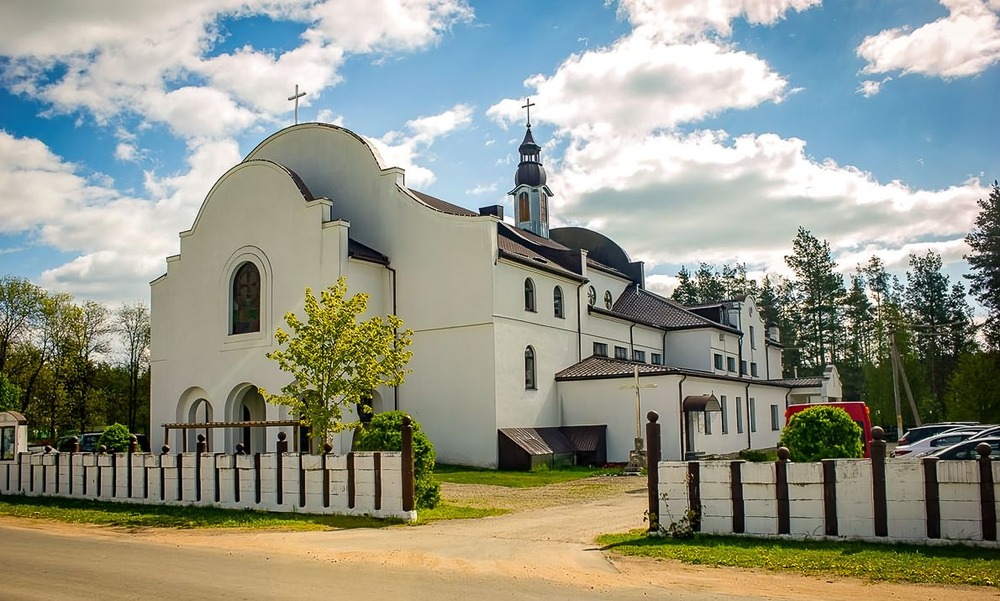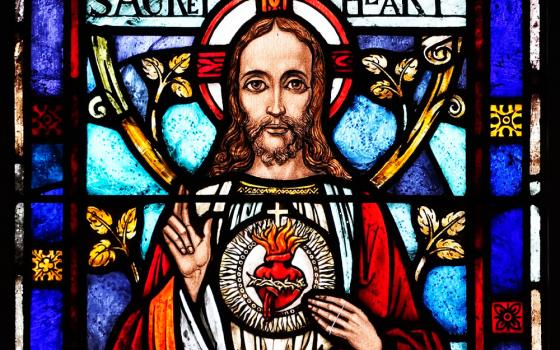
The sanctuary of Our Lady of Fatima at Shumilina, Belarus, in the northeastern Vitebsk Diocese is seen in an undated photo. Two priests who work there, Oblate Fathers Andrzej Juchniewicz, chairman of Major Superiors, Delegates and Representatives of Institutes and Societies of Apostolic Life in Belarus, and Pavel Lemec were detained by civil authorities May 8, 2024, and two days later given 10-day and 15-day detention, respectively. (OSV News/courtesy CatholicBY)
Leaders of the Missionary Oblates of Mary Immaculate have deplored an information blackout surrounding the arrest of two of their priests in Belarus.
"No one from the Catholic Church was represented at their court hearing, and no details or access were provided," said Father Pawel Gomulak, spokesman for the religious order's Polish province.
"We're still seeking reliable information about their current status and detention conditions, as well as about the penalties they face and how we might help them."
The priest was reacting to the detention of Father Andrzej Juchniewicz, chairman of Major Superiors, Delegates and Representatives of Institutes and Societies of Apostolic Life in Belarus, and his younger colleague, Father Pawel Lemekh.
Both priests worked at the northeastern Vitebsk Diocese's sanctuary of Our Lady of Fatima at Shumilina, and were given 15- and 10-day detention orders, respectively, on May 10.
In an OSV News interview, Gomulak said options for assisting the two priests were limited since both were Belarusian citizens of Polish descent, while the Oblates had no legal status in the country.
However, a veteran opposition spokesman said the denial of information and access was "normal procedure" in Belarus to fuel fear and uncertainty.
"Those detained are told the reason, under the Administrative Code — but can't communicate this to others — and since this court hearing was conducted online via Skype, no one could attend it," explained Natallia Vasilevich, coordinator of the ecumenical Christian Vision organization.
"People can be accused of anything, however small, and have their phone messages searched for so-called extremist material dating back years. Even those with no previous political record can be arrested and punished this way," she said.
Church sources said Juchniewicz was arrested at his Shumilina parish May 8 after addressing a gathering of Catholic clergy led by Vitebsk's Bishop Aleh Butkevich.
They said Lemekh was detained shortly afterward while traveling to neighboring Poland to meet Oblate order leaders from across Europe.
Confirming the arrests in a May 10 statement, the Oblates requested prayers for the priests, and for parishioners left without pastoral care.
The order added that both priests appeared to have been accused of "alleged diversionary activities against the Belarusian state."
Meanwhile, the Oblates' Rome-based Spanish superior general, Father Luis Ignacio Rois Alonso, told Italy's Servizio Informazione Religiosa May 13 the order was "deeply concerned" about the arrests, and was seeking ways to ensure the priests' "health and safety."
The Catholic Church makes up a 10th of the 9.4 million inhabitants of Belarus, a former Soviet republic, where the disputed August 2022 reelection of Alexander Lukashenko after 26 years as president was followed by harsh repression and international sanctions.
In a May 13 report, the southeastern-Belarus Gomel-based unofficial Catholic website, Katolik-life, said the two priests had been arrested in connection with posting content on the internet dubbed "extremist" by the government, and that according to their information they were convicted to 10-15 days in prison.
Advertisement
In his OSV News interview, Gomulak said the Oblates had faced "no particular problems" with their pastoral work in Belarus.
However, he added that Juchniewicz and Lemekh had been questioned earlier by regime officials after "expressing solidarity in the name of the Oblates" with Ukrainians after Russia's February 2022 invasion, and requesting "prayers for a swift end to the war."
"What's saddest is that these detentions happened on the eve of Ascension Day and shortly before the May 13 feast day of Our Lady of Fatima, meaning they couldn't be at their parish for its main liturgical festival," the Oblates' spokesman told OSV News.
Meanwhile, Vasilevich said it was likely the arrests were connected with the May 8 clergy gathering at Shumilina, as "a police punishment to disrupt parish life."
"The arrest of priests has become quite normal in Belarus — no one is surprised or outraged any more if priests spend time in prison, while the fact that neither church nor Vatican even react shows how repression has been normalized," the Christian Vision coordinator told OSV News.
"Priests held in the Vitebsk region are usually kept in isolation cells, which makes it much worse for them. It's also common practice for those detained to be ordered to make a confession video — and to be left in prison if they refuse," she said.
In a January report, the pontifical charity Aid to the Church in Need said Belarus ranked second in the world after Nicaragua for the number of arrested Catholic priests, with 10 detained on extremism and treason charges in 2023, along with many lay Catholics.
In a brief reference to the clergy arrests, which are not usually acknowledged publicly by Belarus's Catholic Church, the Vitebsk Diocese's curia confirmed May 16 that Juchniewicz and Lemekh remained in detention, and requested prayers "that the Holy Spirit will give them the necessary strength and strengthen them in this trial".
The Vitebsk Diocese's chancellor, Jesuit Father Viktor Misevich, told OSV News that efforts would be made to ensure Masses continued at the Lady of Fatima sanctuary, where a rosary service was held May 10 for the detained priests.
"But these will have to happen without special pastoral care," the priest said.
"Although our bishop went to the court in search of information, the case was conducted without anyone present and there was no consultation. In the past, there would have been some kind of reaction, but today no reaction seems possible," he said.








